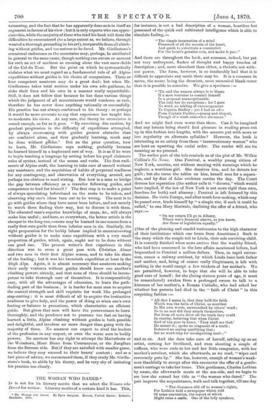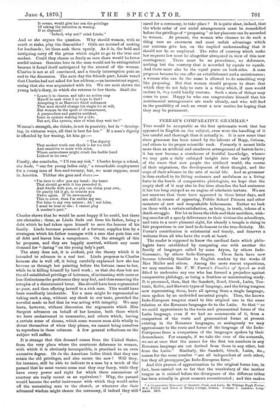Tim WOMAN WHO DARED.* T is not for its literary
merits that we select the Woman who Dared for review. Literary merits of a certain kind it has. This, • The Woman who Dared. By Epea Sargent. Boston, United States: Roberts, Brothers. 1870.
for instance, is not a bad description of a woman, heartless but possessed of the quick and cultivated intelligence which is able to simulate feeling,—
"The simple incarnation of a mind
Possessed of all the secrets of the heart, And quick to substitute a counterfeit For the heart's genuine coin, and make it pass."
And there are throughout the book, not common, indeed, but yet not very unfrequent, flashes of thought and happy touches of description ; and, more abundant than either, a rhetoric not with- out power. The form, however, is so intolerably bad that it is difficult to appreciate any merit there may be. It is a romance in metre, the metre being the dreariest, most umnitsical blank-verse that it is possible to conceive. We give a specimen :—
" 'Tis said the woman always is to blame If a man ventures to commit himself In a proposal unexceptionable. The rule has its exceptions ; for I gave No word, no inkling of encouragement To Captain Dudley ; yet I had an offer From Captain Dudley,—young and elegant, Though of a stock somewhat attenuate."
And we might find even worse than these. Can it be imagined that any human being should find pleasure in reading prose cut up in this fashion into lengths, with the accents put with more or less regularity on alternate syllables? However, the book is interesting as an outcry from those "insurrectionary women" who are bent on upsetting the social order. The reader will see its meaning as we proceed.
The earlier part of the tale reminds us of the plot of Mr. Wilkie Collins's No Name. One Percival, a wealthy young citizen of New York, marries, not without meeting with warnings which he neglects, a worthless girl. She deceives him, and he detects her guilt ; but she turns the tables on him, herself sues for a separa- tion, and by dint of false evidence carries the day. The Court decrees her separation (the author calls it " divorce," which would have implied, if the law of New York is not more rigid than ours, freedom for both) and alimony ; Percival is left fettered by this decision. He visits Europe, and after much love-making, which may be passed over, binds himself by "a simple rite, if such it could be called," to one Mary Merivale, declining the offer of a friend, who says :—
" On my return I'll go to Albany,
Where war's financial sinews, as you know,
Are those of legislation equally."
(One of the pleasing and candid testimonies to the high character of their institutions which one hears from Americans.) Such is the story which the couple tell to Linda, their sole surviving child. It is scarcely finished when news arrives that the wealthy friend, who had been concerned in the love affairs mentioned before, had bequeathed to Percival a million dollars. Then, in rapid succes- sion, comes a railway accident, by which Linda loses both father and mother, and, being of course really illegitimate, is left with nothing in the world except a few trinkets of her mother's. We are permitted, however, to hope that she will be able to take good care of herself ; for she (being sixteen years of age, it must be remembered) awakes from a prolonged swoon to talk to a kinsman of her mother's, a Roman Catholic, who had asked her whether her parents had died in the "faith of Christ" in this surprising fashion :—
" All that I mean is, that they held the faith Which was the faith of Christ. as manifest In His own words, unwrenched by others' word ; So to no sect did they attach themselves, But from all sects drew all the truth they could In charity, believing that when Christ Said of tne poor in heart, They shall see God,' He meant it ; spoke no fragment of a truth ; Deferred no saying qualifying that ; Set no word-trap for unsuspecting Souls;"
and so on. And she does take care of herself, setting up as an artist, earning her livelihood, and even shooting a couple of ruffians, who were rude to her and her little companion, with her mother's revolver, which she afterwards, as we read, "wipes and reverently puts by." She has, however, enough of woman's weak- ness thankfully to accept after this encounter the offer of a gentle- man's carriage to take her home. This gentleman, Charles Lothian by name, she afterwards meets at the sea-side, and we begin to see how she earned her title as "the woman who dared." The pair improve the acquaintance, walk and talk together, till one day
"The discourse slid off to woman's rights, For Lothian held a newspaper which told Of some convention, the report of which Might raise a smile. One of the lady speakers,
It seems, would give her sex the privilege Of taking the initiative in wooing, If so disposed!
'Indeed, why not?' cried Linda."
And so she argues the question. Why should women, with so much at stake, play the dissembler? Girls are accused of seeking for husbands ; let them seek them openly. As it is, the bold and intriguing carry off the prizes which ought to go to the true and modest. Could they choose as freely as men there would be fewer sordid unions. Genuine love in the man would not be extinguished because it found itself anticipated by the avowal of the woman. Charles is not at all convinced, and a timely interruption puts an end to the discussion. The next day the friends part, Linda vexed that Charles had not asked for her address,—an inconsistent regret, seeing that she was acquainted with his. We are next shown the young lady's diary, in which she returns to her thesis. Shall she
"Leave it to chance, and take no active step Myself to seek what I so hope to find? Accepting it as Heaven's fixed ordinance That man should change his single lot at will, But woman be the sport of circumstance, A purposeless and passive accident, Inert as oysters waiting for a tide, But not, like oysters, sure of what they wait for?"
Woman's strength, she thinks, is not in passivity, but in "develop- ing, in virtuous ways, all that is best for her." If a man's dignity is offended by her wooing, let him go :—
" The dignity
That modest truth can shock is far too frail And sensitive to mate with mine, Whose earnestness might crush the feeble hand Linked in its own."
Finally, she concludes, "I'll run my risk." Charles keeps a school, she finds, "one for young ladies only," a remarkable employment for a young man of five-and-twenty, but, we must suppose, usual in America. Thither she goes and dares :—
"rm here to offer you my hand; the heart
That should go with it has preceded it, And dwells with you, so you can claim your own, Or gently bid it go, to trouble you Never again. If 'tis unwomanly This to avow, then I'm unlike my sex, Not false to my own nature ; Ah ! not false.
I must be true or die : I cannot play A masker's part."
Charles shows that he would be most happy if he could, but there are obstacles ; these, as Linda finds out from his father, being a debt which he had taken upon himself to save the honour of his family. Linda becomes possessed of a fortune, supplies him by a stratagem which his father manages with a sum that puts him out of debt and leaves him a competence. On the strength of this he proposes, and they are happily married, without any more demand for "daring" on the young lady's part.
The story does not, it is evident, put the theory which it is intended to advance to a real test. Linda proposes to Charles because she is well off, it being carefully explained how she has become so through her painting before the fortune came to her, while he is killing himself by hard work ; so that she does but use the old-established privilege of heiresses, of intimating with more or less distinctness the preference they may feel, and thus removing the scruples of a disinterested lover. She should have been represented as poor, and then offering herself to a rich man. This would have been manifestly intolerable. Yet a man might be represented as taking such a step, without any shock to our taste, provided the novelist made us feel that he was acting with integrity. We may leave, however, without discussion the arguments which Miss Sargent advances on behalf of her heroine, both those which we have endeavoured to summarize, and others which, having a certain sense of shame, which some women seem able wholly to divest themselves of when they please, we cannot bring ourselves to reproduce in these columns. A few general reflections on the subject will suffice.
It is strange that this demand comes from the United States, from the very place where the courteous deference to women, with which it is obviously incompatible, is practised to an even excessive degree. Or do the American ladies think that they can retain the old privileges, and also secure the new? Will they, for instance, still be able to indicate to a man by a touch of the parasol that he must vacate some seat they may fancy, while they have every power and right for which these concessions of courtesy are really meant as an equivalent ? Why, the parasol would become the awful instrument with which they would order off the unresisting man to the church, or wherever else their advanced wisdom might choose the ceremony, if indeed they still cared for a ceremony, to take place ? It is quite clear, indeed, that the whole order of our social arrangements must be remodelled before the privilege of " proposing " at her pleasure can be accorded to women. At present, the woman who chooses to do such a thing uses an enormous and most unfair advantage which our customs give her, on the implied understanding that it should not be so employed. The rules of courtesy which make her requests law must be altogether abrogated in view of this new contingency. There must be no precedence, no deference, nothing but the courtesy that is accorded by equals to equals. And there must also be the equal purse on both sides. A man proposes because he can offer an establishment and a maintenance; a woman who can do the same is allowed to do something very like proposing. But that women should propose to share that which they do not help to earn is a thing which, if men would endure it, they could hardly venture. Such a state of things may come to pass. Happy he who can congratulate himself that his matrimonial arrangements are made already, and who will find in the possibility of such an event a new motive for hoping that they may be permanent.































 Previous page
Previous page